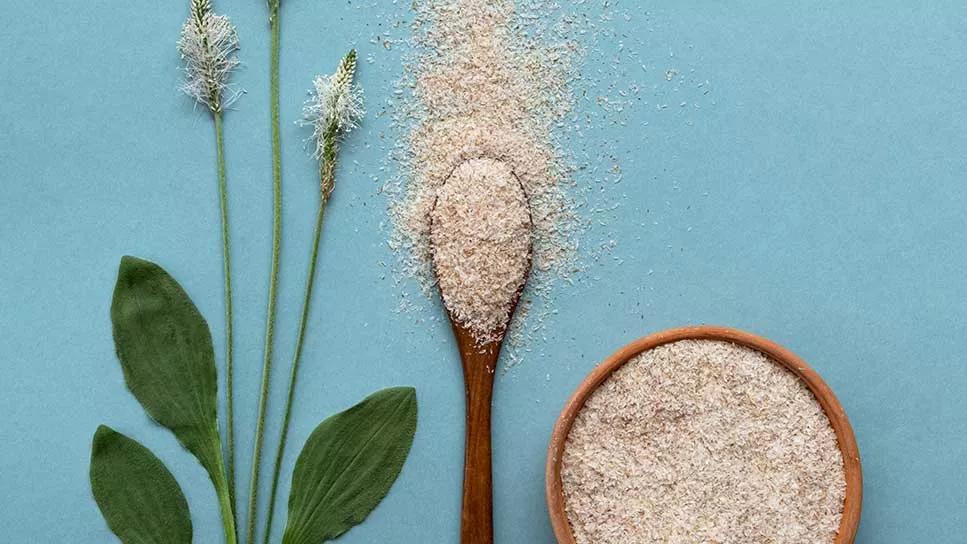The fiber supplement can help ease constipation, manage diabetes and lower LDL cholesterol

Image content: This image is available to view online.
View image online (https://assets.clevelandclinic.org/transform/6f8d541e-3eed-4991-b865-33e0c518251f/Psyllium-Husk-1335445063-967x544-1_jpg)
psyllium husk and psyllium husk powder on wooden spoon and in wooden bowl
Constipated? Eat more fiber.
Advertisement
Cleveland Clinic is a non-profit academic medical center. Advertising on our site helps support our mission. We do not endorse non-Cleveland Clinic products or services. Policy
Wanting to improve your IBS symptoms? Eat more fiber.
Trying to manage your diabetes? Eat more fiber.
Looking to lower your LDL cholesterol? Eat more fiber.
You’ve probably heard the phrase, “Eat more fiber” more than you’d like. But there’s good reason it’s a popular refrain. Fiber does all kinds of great things in your body.
And you may have heard about psyllium husk, a type of soluble fiber. It’s been getting a lot of hype when it comes to weight loss (some have called it the “poor man’s Ozempic®” or “natural Ozempic”).
So, what does psyllium husk do?
Registered dietitian Julia Zumpano, RD, LD, explains the benefits of psyllium husk and if it will actually help you lose weight.
Native to India, psyllium is a seed — and psyllium husk is the outer covering of psyllium.
“It’s a soluble fiber, therefore, it absorbs water to form a gel that can be used in baking or as a supplement,” explains Zumpano.
You can typically find psyllium husk in fiber supplements like Metamucil®. And you can find psyllium husk powder and psyllium husk capsules or pills.
You may be wondering: Is psyllium husk gluten-free?
Yes, says Zumpano.
“It can be added to drinks or foods to help increase fiber intake,” she adds. “It can be used as a gum in gluten-free baked goods.”
Advertisement
And psyllium husk can be gentler on your digestive system than stimulant or osmotic laxatives. It doesn’t cause your intestines to contract or use water to soften your stool. It works by increasing the weight of your stool, which helps trigger a bowel movement.
Psyllium husk comes with a few health benefits like:
Psyllium husk also has some prebiotic qualities.
“Although psyllium is resistant to fermentation, gut bacteria can ferment a small amount of psyllium, which creates short-chain fatty acids including butyrate which has some health benefits,” she adds.
It can.
“Fiber can keep you fuller longer and sooner, which can lead to decreased appetite and overall intake,” explains Zumpano. “It also aids in regular bowel movements, which can support weight loss and management.”
So, what about the claim that it’s just as good as weight-loss drugs like Ozempic?
“We don’t have any clinical trials that compared the two, but psyllium husk can support weight loss but not to the extent of a medication has potential to,” clarifies Zumpano. “They work differently in the body.”
Psyllium husk is considered very safe, reassures Zumpano.
So, how much psyllium husk per day should you use?
“Start at a small dose, about 1 teaspoon, and increase slowly,” she advises. “And make sure you’re drinking plenty of water.”
You can advance to taking 1 tablespoon three times per day, with the goal of having soft-formed stool bowel movements one to two times a day.
But Zumpano warns that people with a sensitive GI system should proceed with caution. While safe, you may experience some psyllium husk side effects like:
Advertisement
Zumpano says it’s best to talk to your healthcare provider before starting a supplement like psyllium husk. And know that supplements and vitamins aren’t regulated by the U.S. Food and Drug Administration (FDA), so you want to do your homework and research before buying a specific brand. Look for options that have been tested by third-party organizations like U.S. Pharmacopeia (USP) or NSF International.
Zumpano recommends giving psyllium husk a try, especially if you have constipation, are looking to manage your diabetes or lower your cholesterol.
And when it comes to psyllium husk and weight loss, know that it’s not a magic ingredient.
But using psyllium husk to make sure you have enough fiber in your diet can be a good move.
“Fiber in general is very helpful for overall health,” she says. “And this is a great way to increase your overall fiber intake.”
Advertisement

Sign up for our Health Essentials emails for expert guidance on nutrition, fitness, sleep, skin care and more.
Learn more about our editorial process.
Advertisement
In a world of confusing choices, your healthcare provider can be your best resource
10 delicious dishes with 10+ grams of fiber per serving
It helps you avoid constipation, stabilize blood sugar, lower cholesterol and stay fuller for longer
This prebiotic is found in a lot of foods that you probably already eat
In the battle of the roughage, which one reigns supreme?
Ground flaxseed is full of heart-healthy omega-3s, antioxidants and fiber, and easy to add to just about any recipe
These small-but-mighty veggies pack a powerful nutritional punch
With a sweet, tangy flavor, tamarind is super versatile and high in antioxidants
Type 2 diabetes isn’t inevitable with these dietary changes
Applying a hot or cold compress can help with pain
Pump up your iron intake with foods like tuna, tofu and turkey